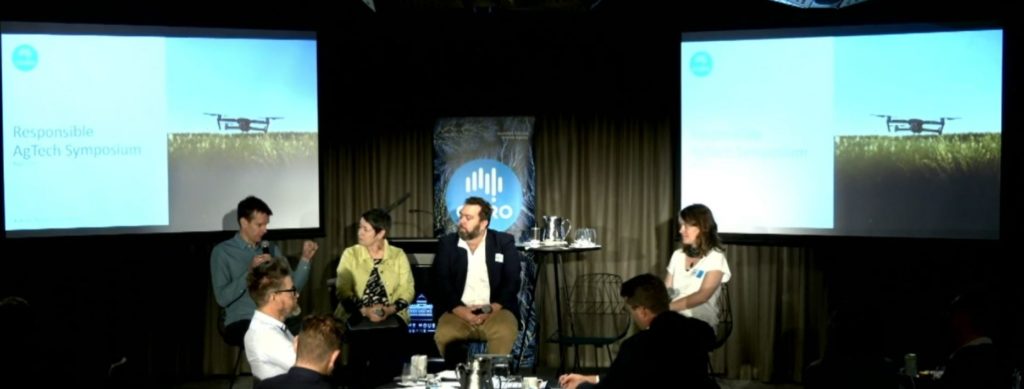May is the month when the Federal Government releases its budget for the coming year. On the morning after the budget release, I was pleased to attend the CropLife Australia Agricultural Industry Federal Budget Breakfast at the National Press Club, where the Minister for Agriculture, Hon David Littleproud MP, outlined how the government would be investing in the sector. While the budget was not all positive news, particularly for universities, it was good to see investments in projects designed to improve biosecurity, grow the agricultural workforce, improve market access, enhance biodiversity and sustainability of farms, and increase drought resilience of rural communities through initiatives targeting the translation/commercialisation/adoption of existing research.
I picked up the issue of research translation in a webinar I gave to the Department of Agriculture, Water and Environment Innovation Hub on 25 May. The title of my talk was ‘Transforming collaboration between industry, government and Australian universities’. I outlined how the ANU is working to build an innovation ecosystem that is better able to engage with industry; translate our fundamental expertise into need-driven research; and create interdisciplinary teams to address complex challenges facing the agricultural sector. While there are many areas needing improvement, my overall sense is that the ANU (and other universities) is working hard to change how it interacts with industry and society more broadly. This is important, as universities are a crucial component of the Australian agricultural innovation ecosystem; they provide the fundamental and applied research capability that the nation needs to address challenges facing the agri-sector. They also train graduates with the skills and knowledge needed by rural industries, both now and in the future.
Importantly, Universities subsidise the costs of much of the research done for the agricultural sector each year; of the approx. $3.3B spent each year on RD&E in the rural sector in Australia, 11% is funded by contributions from universities (source: Ernst & Young 2019), with much of that contribution coming from student fees. Thus, while universities clearly benefit from income derived from doing rural related research, they also make a substantive contribution to the research needed by growers across the country. With COVID-19 placing the student fees subsidisation of research model under threat (via border closures and loss of overseas students), there is a risk that we will lose some of the world class research capacity that our rural R&D system so heavily depends on. My hope is that while we definitely should develop programs that increase our ability to translate, commercialise and adopt research, we also need to ensure the health of our research sector. For without a world-class research capacity – one that is industry relevant – our ability to develop solutions to the complex challenges facing the country will be severely diminished.
A highlight of April Director’s Message was the release of the AgriFutures Australia report on the impact and potential of space-based technologies in the rural sector, for which CEAT made a major contribution, along with several areas across the ANU, including the Research School of Earth Sciences and InSpace. The report – which covered use of satellites for remote sensing, geolocation and connectivity – has been well received. Following its release, the report’s lead author, Prof. Paul Tregoning, was called to answer questions by the Parliamentary Inquiry into Developing Australia’s Space Industry, chaired by the Hon Barnaby Joyce, MP. The Inquiry asked Paul a range of questions, including how artificial intelligence can be used to improve low-cost imagery, the extent to which farmers use satellite internet and how Australia can catch up to other countries in the deployment and application of space technologies. It is great to see the report stimulating this sort of interest in how space technologies can support the rural sector – a topic that CEAT’s Martin Amidy discusses in a Q&A article that you can find here. Marty also participated in a really interesting AgriFutures On Air podcast entitled ‘Out of this world: why ag is the next frontier for space tech’, where they explore how “Producers are routinely using satellite imaging, low bandwidth sensors, GPS tracking, autosteer, paddock level imagery and weather forecasting to drive better decision making”. Also on the podcast is Tom Rayner from Myriota and Philip Tickle from Cibo Labs – it is well worth a listen!

When CEAT was launched in August 2018, one of the speakers at the launch event was Sarah Collingwood, CEO of Four Winds Winery in Murrumbateman just outside of Canberra. In her presentation, Sarah talked about how technology is used to improve the sustainability and profitability of her business, and the importance of being part of regional networks. Since then, CEAT has slowly built up a range of regional connections, working with farmers, government agencies and industry across the ACT and South East region of NSW. These connections have provided opportunities for researchers in the ANU-CSIRO Precinct to develop a better understanding of the real-world challenges facing the agri-sector, and to help develop solutions that are fit for purpose. It was in this spirit of regional connections that I was pleased to see members of the CEAT team attend the Food in the Capital event (organised by Michael Claessens and his team at Regional Development Australia ACT) that was held 18-19 May in Canberra. The event provided attendees with an excellent opportunity to learn about innovations in urban and regional farming, logistics and social enterprises, meet local producers and learn about food-related research taking place in the Canberra region. Make sure you read reflections on the event from two of the CEAT team, one from Sarah Biggerstaff and the other from Shikha Sud, in this month’s CEAT Newsletter. The Newsletter also provides a CEAT perspective on the virtual panel event run by the Australian AgriTech Association on Sustainable supply chains: creating trust & resilience from farm to table. The panel explored a range of issues relevant to how we create sustainable, resilient and trusted value chains that connect farmers to consumers.
CEAT was proud to host a group of Food in the Capital attendees at the CEAT Hub on 19 May – the visit provided an opportunity to showcase the fantastic food-related research and innovation taking place in the Precinct. Prof Bob Furbank talked about how the ARC Centre for Excellence in Translational Photosynthesis has been at the cutting edge of efforts to improve crop productivity and climate resilience, while Prof Saul Cunningham from the Fenner School of Environment and Society outlined some of the work his group are doing to improve sustainability and efficiency of pollination in food production systems. The event also provided an opportunity for two of the start-ups based in the CEAT Hub (Dr Anna El Tahchy from Nourish Ingredients, and Dr Stephen Trowell from PPB Technology) to pitch to the visitors. You can learn more about the Food in the Capital event here.

The month of May was also a busy month for Denise Higgins (CEAT Senior Manager Strategic Planning & Evaluation), Dr Rachael Rodney Harris (CEAT Innovation Training & Education Lead) and Professor Janelle Allison (CEAT Fellow) as they piloted our first CSIRO-CEAT Responsible Innovation course; the course enabled participants to develop their own views and stance on what it means to practice innovation responsibly. Following the course, Denise headed to Brisbane to participate in the CSIRO Responsible AgTech Symposium; the event explored how the agri-sector can be strengthened through the responsible applications of science and agricultural practices.

Last week, I was super pleased to outline how ANU is working with CSIRO to create a vibrate agri-tech innovation ecosystem at the ‘Ventures into the Ecosystem – Startups, Scaleups and Grants’ event held at ANU. The event – organised by the ANU Office of Business Engagement & Commercialisation, CEAT and AusIndustry – was a fantastic opportunity to see examples of how research ideas can and do lead to new businesses.
Finally, a huge thank you to Chris Watt who has just completed a marketing internship with CEAT. Over the past several months, Chris has written several pieces exploring opportunities where technological innovation is helping improve the resilience, sustainability and profitability of agriculture. You can read his last piece – ‘What will the future of agriculture look like?’ – here. We wish Chris well for the future.
Make sure you read the articles in this month’s newsletter.
Thank you.
Owen Atkin, Director, CEAT.
